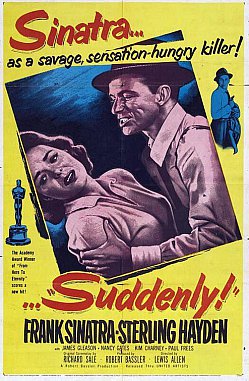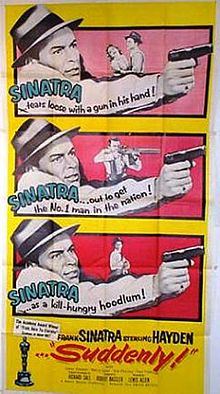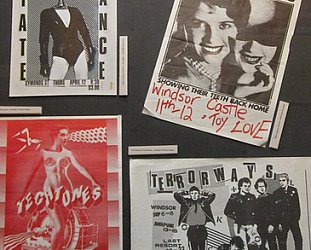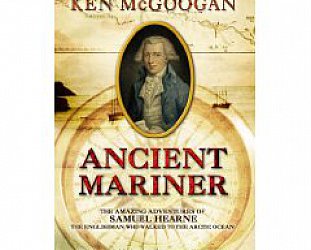Graham Reid | | 4 min read

Suddenly is a Californian town where everybody knows everyone, it has been a “quiet day for the last 50 years” and words like shucks, swell and heck punctuate conversations. This setting for the 1954 B-grade thriller (directed by Lewis Allen) has, in retrospect, a corny naivety similar to Lumberton, David Lynch’s parody of small town Americana in Blue Velvet.
But unlike Lumberton where evil lurks beneath the town’s pleasant surface, malevolence comes to Suddenly in the form of the hired hit man John Baron (Frank Sinatra) and his two sidekicks. Intending to assassinate the US President scheduled to briefly detrain; Baron’s sudden burst of violent disruption shakes up stagnant lives and provides the film’s title with a second meaning.
The perfect setup for Baron’s “big, beautiful booby trap” is a house overlooking the train station belonging to Pop Benson (played with a hammy enthusiasm by James Gleason) who lives with his daughter-in-law Ellen (Nancy Gates) and grandson Pidge (Kim Charney).
The Bensons become hostages along with the town’s Sheriff Tod Shaw (Sterling Hayden, who shared star billing with Sinatra) and a dim witted TV repair guy, who has a nice line in cold war paranoia: “They’re commies, they’re enemy agents”.
 The majority of the
film plays out in the Benson’s cramped living room contributing to
the film’s tight, claustrophobic feel of trapped lives, for both
captives and criminals.
The majority of the
film plays out in the Benson’s cramped living room contributing to
the film’s tight, claustrophobic feel of trapped lives, for both
captives and criminals.
The character of John Baron with his criminal complications provided Sinatra with an opportunity to broaden his dramatic range.
Since the late Forties he'd tried to reestablish himself in films but his early roles in musicals like Anchors Away and The Kissing Bandit (a film Sinatra personally hated) only reinforced public perception of Sinatra as a lightweight actor.
Sinatra’s musical career had also slumped by the early Fifties and the man once known as Swoonatra no longer appealed to teenagers. His turning point was an Oscar for Best Supporting Actor in From Here to Eternity (Fred Zinnemann 1953).
Suddenly was his follow-up and John Baron's edgy character was a stepping stone to Sinatra’s performance in Otto Preminger’s The Man With The Golden Arm, (1955) the first Hollywood film to openly address drug addiction.
Baron isn’t a Soviet agent and he’s unconcerned with Eastern bloc politics, American patriotism and the moral implications of killing the president.
A twitchy loner who gets a kick out of killing and thrives on the power of firearms – “When you have a gun, you are a sort of god …” – he’s motivated solely by money. However he does have some great lines of gangster wit and cynicism: “If anybody gets brave kill ‘em. You can only hang once.”
Baron’s pulpy dialogue is one of the most enjoyable aspects of the film.
The single female character Ellen, a war widow, grieves her husband’s death and consequently is opposed to all forms of violence. She is overly protective of her son and told in what is surely a dangerous case of mixed-up metaphors “You can’t wrap the boy in cellophane”.
She’s a pathetic creature in need of a little gumption so when Pop barks “Ellen, would you please stop being a woman”, she could snarl back “And what wrong with being a woman, huh?” She’s also the only one who develops any shift in character by recanting her pacifistic morals and firing the first bullet that incapacitates Baron. And by implication, proving (according to the film’s logic) guns aren’t necessarily a bad thing.
In an early scene Tod declares his love for Ellen, they squabble a bit but by the end of the film their ordeal with Baron has brought them strangely closer together. Tod is steady, dependable surrogate father figure for Pidge, representing a return to the nuclear family unit.
Conversely Baron was dumped in a home by an unmarried mother and alcoholic father, his dysfunctional upbringing, an explanation for his maladjustment. Fourteen years after Suddenly, Fifties patriarchal family values would be violently rejected in George Romero’s Night of the Living Dead. The cult film with intentional B-movie production values and late Sixties counter culture ideals, featured an infamous scene of a (zombie) child killing her parents and devouring her father. A grisly anti-parental gesture which, like Suddenly, reflected societal concerns of the era.
But this was Sinatra's vehicle and a stepping stone to Man with the Golden Arm where he played another character who walked on the wild side, Frankie Machine, a heroin addict trying to get clean, go straight and land a job as a jazz drummer.
Sinatra was proud of his work in that film: “I thought I won the Oscar for the wrong picture … I did the finest work I ever did in my life on that film.”
American film critic Jonathan Rosenbaum, agreed, “… what is surely the strongest of all Frank Sinatra’s dramatic performances.”
There is a scene in Suddenly, where Baron explains a little of his backstory via his war time experiences. He walks slowly towards the camera until his head and shoulders fill the frame; he looks directly out and continues his speech.
For a brief moment it seems Baron has broken the fourth wall and will speak directly to the audience. Imagine what he would say, perhaps he would drop his Baron persona and speak as himself and say something like “Screw this B-grade baloney. I’m better than this. I’m more than a song and dance man – I’m an Actor and the best is yet to come.”
Suddenly -- in which many say Sinatra bears some resemblance to Lee Harvey Oswald -- is available at JB Hi-Fi stores discount bins for $3.
Sarah Jane Rowland is a writer who lives in Auckland, works in a library and her not-so secret passion is film. She is well read and well viewed. Her previous contributions to Other Voices Others Rooms are here.
Other Voices Other Rooms is an opportunity for Elsewhere readers to contribute their ideas, passions, interests and opinions about whatever takes their fancy. Elsewhere welcomes travel stories, think pieces, essays about readers' research or hobbies etc etc. Nail it in 1000 words of fewer and contact graham.reid@elsewhere.co.nz.
See here for previous contributors' work. It is wide-ranging, huh?





post a comment